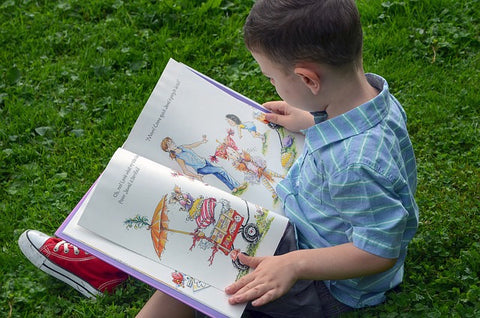Your Cart is Empty
Serving K-12 Kids In Public, Private or Homeschool Settings
Serving K-12 Kids In Public, Private or Homeschool Settings
How To Teach A Child To Read - Avoid These 11 Common Reading Mistakes At All Costs!
March 05, 2024 5 min read

Reading is a core ability that children learn at an early age. That’s why parents need to recognize their role in playing a part in laying a strong foundation for this important life skill. Yet, despite acknowledging its importance, many moms and dads often feel uncertain about how to teach a child to read and where they should begin.
If you’re wondering how to help kids read, this post will guide you. We'll introduce the most common reading mistakes and the top proven solutions that parents can use to smoothen the learning process for their young readers. These strategies will enable parents to empower themselves with the knowledge and tools necessary to support their young readers.

11 Strategies To Teach Your Children How To Read with By Turning Frustration Into Confidence!
Mistake #1:
Pushing Too Hard or Too Soon.
Believe it or not, teaching kids to read too early can be ineffective. According to studies, this premature push can lead to heightened frustration among children, as they may expend unnecessary time grappling with skills beyond their current capabilities.
Solution:
Children need to establish a strong foundation first before they can learn how to read. This can be done by first teaching children phonics-based lessons. In other words, they need to be able to memorize their ABCs along with the corresponding sounds.
Mistake #2:
Ignoring Individual Interests.
When you hear your little one say that books are boring, it could be interpreted as “what I’m reading doesn’t interest me.” When parents teach a preschooler to read but steer clear of the books they want to read, it can dampen their motivation.
Solution:
There is so much reading material out there. Learning to read for kids involves allowing a child to explore the variety of books out there. You can also reach out to students, librarians, and teachers to help you brainstorm titles your child will enjoy.
Mistake: 3
Neglecting Phonemic Awareness.
Phonemic awareness teaches young readers the fundamental principles of the alphabet. Without this core skill, children will struggle with reading fluency.
Solution:
As you teach a child to read, try various games and activities with a focus on rhymes, sound manipulation, and phonics. Encourage them to listen to the sounds as you pronounce the words.

Mistake #4:
Not Modeling Reading Habits.
Children mirror what adults do. In other words, part of helping kids read is to make them see that their parents also read.
Solution:
Set a good example by showing kids that reading should be part of daily practice. Create a cozy reading corner at home where the family can spend quality time immersed in books together. Encourage discussions about stories and characters to create a deeper understanding and appreciation for reading as a shared activity.
Mistake #5:
Lack of Consistency
Consistent effort is key to developing reading habits in kids. If children disrupt their reading routine, it's impossible for the skill to be second nature to them.
Solution:
Teach kids to read by establishing a routine that encourages positive reading habits. Read a bedtime story together with a focus on their favorite stories to maintain their interest.

Mistake #6:
Overlooking Vocabulary Building
Just because parents understand a word doesn’t mean it goes the same for their kids. Even during early childhood, children's vocabulary may differ vastly from adults'.
Solution:
When you teach your children how to read, introduce new words in context to help children grasp their meanings and usage more effectively. Encouraging conversations that incorporate varied vocabulary and providing opportunities for children to encounter new words through reading diverse materials are effective strategies for vocabulary building.
Mistake #7:
Not Addressing Reading Challenges Early
When parents observe areas of improvement in their child's reading skills, they should address them immediately. Persistent reading challenges in children can lead to frustration, diminished self-esteem, and reluctance to engage with learning materials.
Solution:
Studies prove that early identification and intervention for reading difficulties significantly improve a child's chances of becoming a proficient reader. Among the ideal ways to teach reading to your child is to ask them what they feel are the challenging parts of a material and if you see a pattern, take action right away.
Steps to learning to read efficiently are possible by reaching out to a reading tutor who can provide personalized assistance and guidance. Click here to get your first one-on-one online reading session with a licensed reading tutor FREE!
Mistake #8:
Not Making Reading Fun
If reading isn't made enjoyable for children, they may develop a disinterest in books and learning. Without the element of fun, they might view reading as a chore rather than an enjoyable activity.
Solution:
Among the best ways to teach a child to read incorporate interactive and engaging activities into the reading experience. When it comes to how to help kindergarteners read, use colorful and captivating storybooks, interactive eBooks, and audiobooks to capture their interest and enrich their imagination. Encourage them to choose books based on their interests so that they can resonate with the material
Mistake #9:
Using a One-Size-Fits-All Approach
Using a one-size-fits-all approach to teaching reading can result in significant challenges for students. Every child has unique learning styles, strengths, and weaknesses. A standardized approach may fail to address individual needs, leading to frustration, disengagement, and a lack of progress.
Solution:
Personalized teaching strategies tailored to individual learning styles allows young readers to get the support and guidance they need. Having an experienced learning coach can help maximize this. Click here to get your first one-on-one online reading session with a licensed reading teacher FREE! See how we can transform your child's reading skills in 30 days or less.
Mistake #10:
Underestimating The Importance Of Comprehension.
Children may struggle to understand and interpret the content they read, hindering their overall reading development and academic success.
Solution:
Helping kindergarteners read involves engaging your child in meaningful discussions about the book's contents, encouraging them to share their thoughts and insights.

Mistake #11:
Not Asking For Help
Given the busy schedules of most parents and their lack of experience in teaching, seeking help from professional tutors for their child's reading skills becomes necessary.
Solution:
When encountering difficulties, don't hesitate to seek assistance from experienced professionals who can dedicate time and expertise to support your child's reading journey. Transform your child's reading skills in the next 30 days or less. Click here to get a free one-on-one online reading session with licensed reading teachers.
Now you can help your child learn to read and have fun!
Conclusion:By consistently implementing the solutions to help your child learn to read, your young reader can master reading within 30 days or less with the guidance of our licensed reading teachers.
Parents need to avoid rushing skill development. Instead, they should focus on solidifying skills such as reading comprehension, building vocabulary, and phonemic awareness.
Avoiding common mistakes such as pushing the skill too early, neglecting to address vocabulary building, and underestimating the importance of comprehension is vital.
Instead, focus on creating a strong foundation with phonics-based lessons, encouraging exploration of diverse reading materials, and addressing challenges promptly. Emphasizing the importance of consistency, personalized approaches, and seeking help when needed are key.
These efforts can help your child learn to read, establishing a lifelong love for reading.
“I still don't know how to teach my child read!”
If this is is still a troubling issue in your mind, take the first step today by clicking here now to claim your free one-on-one online reading session with a licensed reading teacher FREE. We can help transform your child's reading skills in the next 30 days or less!
Transform Your Child's Education In The Next 30 Days Or Less!
Top-rated one-on-one online tutoring with licensed K-12 teachers - your first session FREE!
Click below to claim your free session! Limited slots available.
CLAIM MY FREE SESSION!